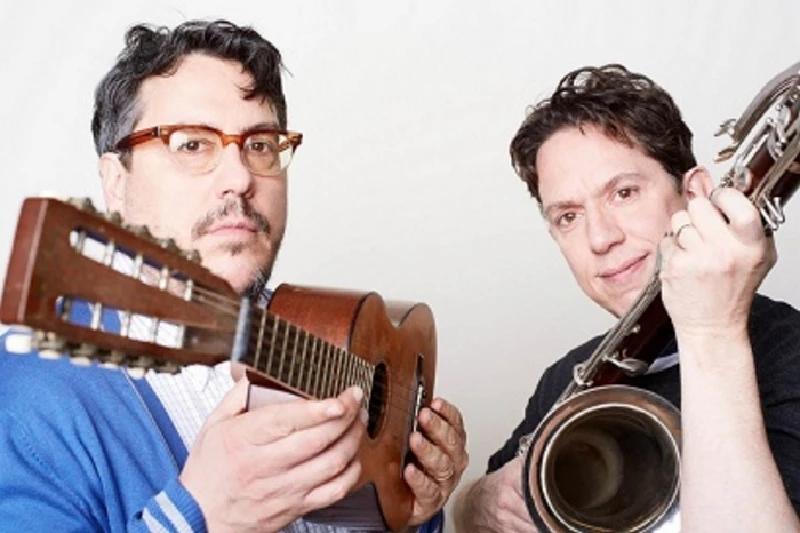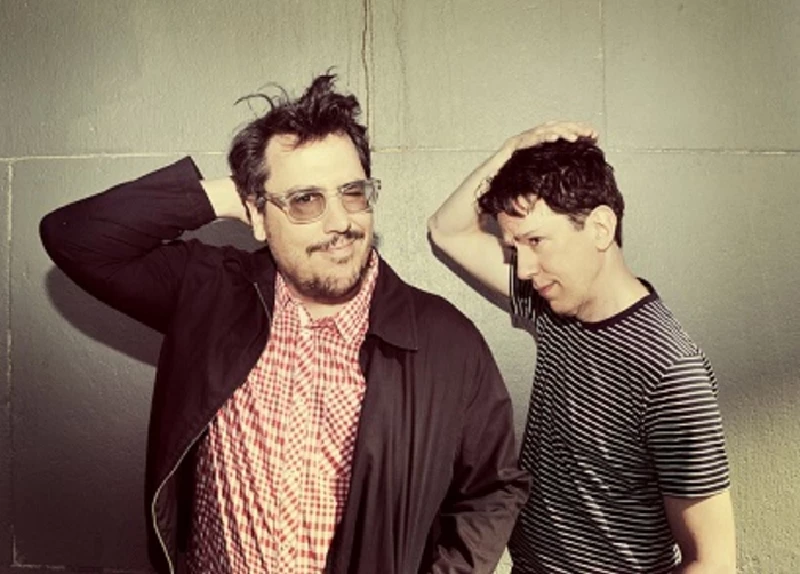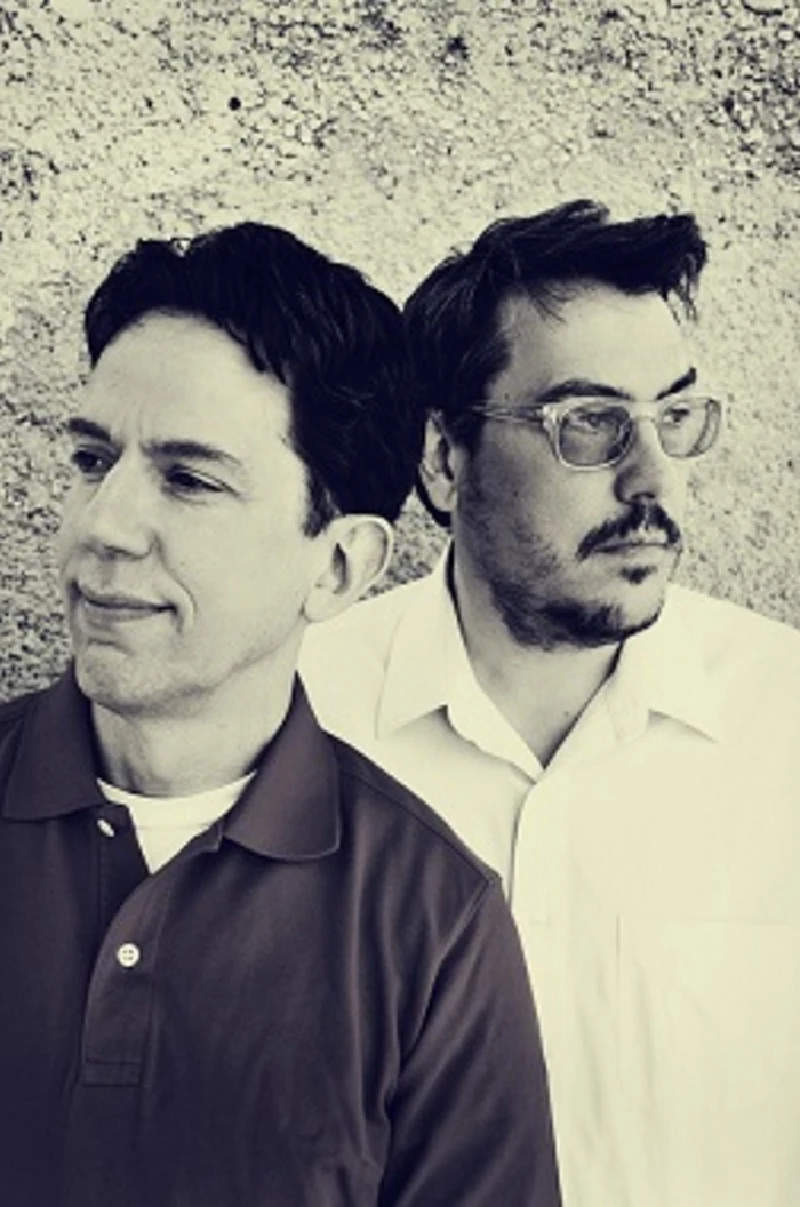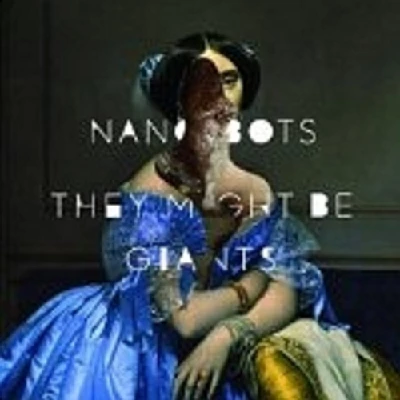They Might Be Giants - Interview
by Paul Waller
published: 30 / 6 / 2013

intro
Paul Waller speaks to John Linnell from critically acclaimed New York-based experimental duo They Might Be Giants about his group's thirty year history and sixteenth and latest solo album
Last year They Might Be Giants celebrated their 30th Anniversary as a band by not celebrating at all. For the two Johns (Flansburgh and Linnell) it was business as usual, it wasn’t the fact that they didn’t want to celebrate it. They were simply so busy touring and promoting their latest record ‘Nanobots’ that they simply missed the boat. Today, They Might Be Giants run things with their own agenda, and having now released sixteen original full length albums since their formation they have most likely earned the right. They run their own record imprint in Idlewild Records and famously are always at the forefront of new methods of recording and releasing their music, whether it was over a telephone connection in the 80s or via their smart phone app today which allows fans to hear new material and back catalogue tracks. The band seem to exist if only to challenge themselves. The duo will be back in the UK this coming November with a tour to promote the new album, their first shows since July 2011 on these shores. To get the lowdown on the new record and live show, Pennyblackmusic got on the phone to New York to speak to John Linnell, delving into the band’s history and their inner workings along the way. PB: Was the approach to your most recent album ‘Nanobots’ different to that you have taken with the rest of your vast back catalogue? JL: Not really, we have had an ingrained way of working for quite a long time now which is that John Flansburgh and I put our demos together at home, and then we give those home made arrangements to the band, and then we all meet up in Manhattan at the studio and hammer out the live band version. That is pretty much the approach. There is always a few technological advances each time we go out and that has a little bit of an effect, but more or less we have been using this method for the last ten years or so. Of course, there are a lot of ways of working within that format, and we have a lot of ways of constructing the demos. PB: Do you have your own studios at home then? JL: We do. John and I both have a home studio and we record in other ways as well. For instance, we have recorded by shouting into one of those voice memo things. PB: Like Michael Jackson did? JL: Is that the way he did it? PB: Yeah. JL: Well, we certainly have demoed some things Michael Jackson style. PB: The song that really pulled me into the new album was ‘Black Ops’; it has an unusual way about it even for a band with many unusual songs. JL: Well, I can’t give you the whole story behind it because it was John Flansburgh’s song, but I know that he began with a vocal melody and I think he just had a drum machine accompaniment. It wasn’t one of those songs where you play your guitar and sing along. It was kind of a cappella and in a character voice. That’s how I would describe it. He was imagining it from the perspective of another person singing, a morally bankrupt individual who is only vaguely aware of the ethical landscape that they inhabit. Of course, he may say something very different, but my impression of the song is that it has a spooky and almost childlike quality about it. PB: It’s creepy. JL: Yes, it’s very creepy. PB: And the video is quite unique. I followed the instructions that came with it and turned all the lights off and watched it in the dark. JL: (Laughs) That’s one of the stand-out tracks on the record, and it’s exciting for me when John brings something in it that always raises the standard of the whole project. PB: What was your favourite track on there? JL: Well they are kind of like your children and you don’t want to play favourites. Hmmm, if I could just dodge that question, err… It’s such a pleasure to have this whole range of things to perform now. We are still in the middle of learning the stuff for the live show. We’ve learned about eight or nine of the songs for the tour that we have been on this year, but we still haven’t got an arrangement for ‘Black Ops’ together and I feel that that is going to be a really interesting challenge for us to play it live. I think it will be very different from the album version. PB: How about ‘Lost My Mind’, another great song on the album? Have you been playing that? JL: Yes, that one we started playing straight away. We learned that before we headed out at the beginning of this year because that’s one that just lends itself to the live show, and we are pretty comfortable with it now. PB: Has there been a point during this sixteen album long career that either of you Johns has said, “Maybe we should quit and go our separate ways”? JL: We haven’t said that (Laughs). We have complained about being old, but at no point has either one said that we should stop doing this. I think we are still surprised at it all. We didn’t have a projected idea of how long this was going to go on or what shape it was going to take when we began, and now that we are thirty plus years into it then it’s surprising how long we have been doing it. This has become business as usual for us, but what is most surprising about it all is that other bands tend to break up well before this point. It feels like such a good thing for us to be doing it, and John and I have both tried doing solo projects, and, yes, that was satisfying in a lot of ways for each of us, but ultimately we think that we benefit most from doing this thing together. In the most obvious way of course we have a brand name that enables us to take risks. We have established this franchise to the point where we can mess around and do something unusual, and we have a pretty attentive core audience that will follow us around if we experiment. That’s a great asset. PB: That must keep you fired up, knowing that your audience wants you to keep being so creative? JL: Yes it does. With a lot of artists you get a sense that their audience will be disappointed if they make too much of a departure, and that if they did some of the fans may fall off. Historically that has certainly happened to a lot of bands where they have tried something different and people get angry and don’t like it. Then you see other bands that play it safe, but you are never assured of loyalty if you screw around with the formula too much. We established early on that there was a wide range of different things that we liked doing; it’s about keeping it interesting for us. The other thing about this is that we have never figured out what people really want so we base each project on what we think is good and the kind of music that we would want to listen to, and that turned out to be the right move for us because we have never been that good at second guessing other people. PB: It’s difficult to compare your current album with many from your back catalogue. With the likes of ‘Lincoln’ from 1988 the one common thread to now seems to be the voices and the phrasing of those voices. Of course the titles are different as well. What made you call it ‘Lincoln’ anyway? JL: We originally had this stupid pun name as a working title. John and I grew up in this town called Lincoln in Massachusetts, and it’s a leafy suburb kind of a place, and it’s not the sort of place that you would make a point of saying you were from if you are playing in a rock band. It’s a very un-rock town. So we wanted to make a point of saying that we were from this not cool place, and that we were not originally from Brooklyn or Detroit or someplace like that. This was about eight or nine years after the Clash released their album ‘London Calling’, so we thought it would be funny to call the album ‘Lincoln Calling’. That was the original idea, and it stuck as a working title. Then we thought that it was just too silly, and we chopped off the pun part and just called it ‘Lincoln’. PB: Do you remember recording it? Your debut was critically acclaimed. Making the follow up must have been an exciting time for you guys? JL: Well, because it was the second album it wasn’t the one where we had accumulated a whole lifetime’s worth of songs, and a lot of the material was written as we were promoting the first album. There were these technical things that were interesting to us that we didn’t have access to on the first album. For example, we were actually using a computer to sequence the whole thing. All the drums and a lot of the keyboards were done on a very primitive 1980’s computer and we got excited about this idea of utilising this in the production. The noise gate in ‘Anna Ng’ had the computer turning on and off the guitar rhythmically, and to us it was just this crazy sound that was appealing that you couldn’t have gotten otherwise. It sounds robotic, and would never sound the same if you were just turning on and off the guitar. That was exciting to us at that time, even though it was on a little Macintosh the size of a small TV set. PB: It was a bit like Gary Numan in some respects then as in to say when a new piece of technology came out you had to utilise it and see what it could do? JL: Well, the thing with Gary Numan was that there was so much that was handmade. It’s techno music, but by today’s standards it sounds like itis hand played. Kraftwerk work in the same way. There was a sense of it being played by hand and not quantised, so nowadays when we listen to something like that we say, “Oh right, humans” (Laughs). PB: With your third record, the hugely successful ‘Flood’, you had to relearn the material as you were playing it live in its entirety. How did that go? JL: We have been doing the ‘Flood shows on and off for the past ten years. Because we have played it so much we have gotten used to it so now we play it backwards, and the advantage of that is that it ends with ‘Birdhouse in Your Soul’. With an album you put your best foot forward or the single at the top, but in this case it comes at the end which is appropriate for a live show. Not only that but we have been playing around with some of the versions like we play ‘Istanbul’ with the full band for probably fifteen years the same way, and right in the middle of this tour we decided to just play it as a duo which is how we originally played it back when it was just the two of us, and we didn’t even use the tape machine, just an accordion, a guitar and two vocals. That now is one of the showstoppers I think because we remembered we did all this vocal improvisation, and we really get to stretch out in that part of the show. It’s a lot of fun. PB: New songs and old songs need to be relearned for the live experience though, right? JL: It’s funny. Our drummer’s daughter is eight years old and was very surprised that we didn’t already know all the songs; she was wondering why if we recorded them that we couldn’t just get up there and play them. It was almost as if she was wagging her finger at us. So we make a point of learning the songs to play live like the new one ‘Icky’, it’s a very live sounding track but it required a little rehearsal. PB: I take it some tracks go down better than others? JL: Yeah, one of the first things we learned was the song ‘You’re On Fire’ because it sounds strikingly different from the other stuff we have done, and it got a great response from people. We have this dramatic thing of a guitar going through an echo, and that part can go on for as long as it takes us to assemble ourselves. It has a nice feel; the vamp of the guitar allows us to slowly walk on stage and get ready and relaxed before we go into it. PB: When you play an older song like say ‘XTC vs Adam Ant’ how does your audience react? JL: Well, we do have a lot of younger people coming to our shows now, and some of them were children when we first started with our kids records. Sometimes I think it’s like a ritual of being in college to come see us. We seem to be on their roster, a victim of that lucky circumstance. I would imagine though that those people don’t have a vivid as notion of the meaning of a song like ‘XTC vs Adam Ant’. Part of the appeal of a song like that is the generational thing. PB: You mentioned the kids albums that you do. They have been incredibly successful. Is there a subject that you will be broaching for the next one? JL: We are going to be making another kids record, but I think that what John and I would like to do something similar to our first kids record where we had no subject and no theme, and in fact it was not even aimed at a particular age group. There were certain songs that we wrote for it that we realised were just too creepy and weird for kids of any age. That was a very general album, and in fact it was very unsupervised, i.e. it was not one of the ones we had done with Disney. We didn’t have a very clear sense that anyone would ever hear that album, but it surprised us and almost everybody by becoming more popular than the very adult record we issued that year so we would like to do another one like that I think. PB: You never talk down to kids, which seems to be the secret formula these days with children’s programming. JL: Right, exactly but we have been accused of talking over the heads of kids quite a lot, but based on my childhood memories if you don’t understand it as a kid then that just makes it more interesting. Of course, there is the fact that you can enjoy something without completely understanding it. PB: I’ve been that way my whole life (Laughs). JL: Me too. PB: Finally John, you are due over here in November to play some shows, what can fans expect? JL: We have a sort of standard set which currently consists of one third the new album, and one third which is the hits or songs that were made into singles and videos ,and then the rest of it is deep catalogue stuff, songs for the front row. It’s going to be great. PB: Thank you.
Band Links:-
http://theymightbegiants.com/https://www.facebook.com/theymightbegiants
https://twitter.com/tmbg
http://www.songkick.com/artists/242200-they-might-be-giants
http://tmbgareok.tumblr.com/
https://www.youtube.com/user/ParticleMen
Picture Gallery:-


soundcloud
reviews |
|
Nanobots (2013) |

|
| Brilliantly offbeat latest album from American alternative duo, They Might Be Giants |
most viewed articles
current edition
Carl Ewens - David Bowie 1964 to 1982 On Track: Every Album, Every SongArmory Show - Interview with Richard Jobson
John McKay - Interview
Colin Blunstone - Thalia Hall, Chicago, 16/7/2025
Bathers - Photoscapes 1
Loft - Interview
Billie Eilish - O2 Arena, London, 10/7/2025
Visor Fest - Valencia, Spain, 26/9/2025...27/9/2025
Sir Tim Rice - Interview
Robert Forster - Interview
previous editions
Heavenly - P.U.N.K. Girl EPManic Street Preachers - (Gig of a Lifetime) Millennium Stadium, Cardiff, December 1999
Peter Perrett - In Dreams Begin Responsibilities Interview Part One
Beautiful South - Ten Songs That Made Me Love...
Boomtown Rats - Ten Songs That Made Me Love....
Coldplay - Wembley Arena. London, 16/8/2022
Prolapse - Interview
Oasis - Oasis, Earl's Court, London, 1995
Trudie Myerscough-Harris - Interview
Pixies - Ten Songs That Made Me Love...
most viewed reviews
current edition
Davey Woodward - Mumbo in the JumboSuzanne Vega - Flying With Angels
Nigel Stonier - Wolf Notes
Vinny Peculiar - Things Too Long Left Unsaid
Lapsley - I'm a Hurricane, I'm a Woman In Love
Philip Jeays - Victoria
Billy Nomates - Metalhorse
Taylor Austin Dye - Sick of Me
Morcheeba - Escape The Chaos
HAIM - I Quit
Pennyblackmusic Regular Contributors
Adrian Janes
Amanda J. Window
Andrew Twambley
Anthony Dhanendran
Benjamin Howarth
Cila Warncke
Daniel Cressey
Darren Aston
Dastardly
Dave Goodwin
Denzil Watson
Dominic B. Simpson
Eoghan Lyng
Fiona Hutchings
Harry Sherriff
Helen Tipping
Jamie Rowland
John Clarkson
Julie Cruickshank
Kimberly Bright
Lisa Torem
Maarten Schiethart